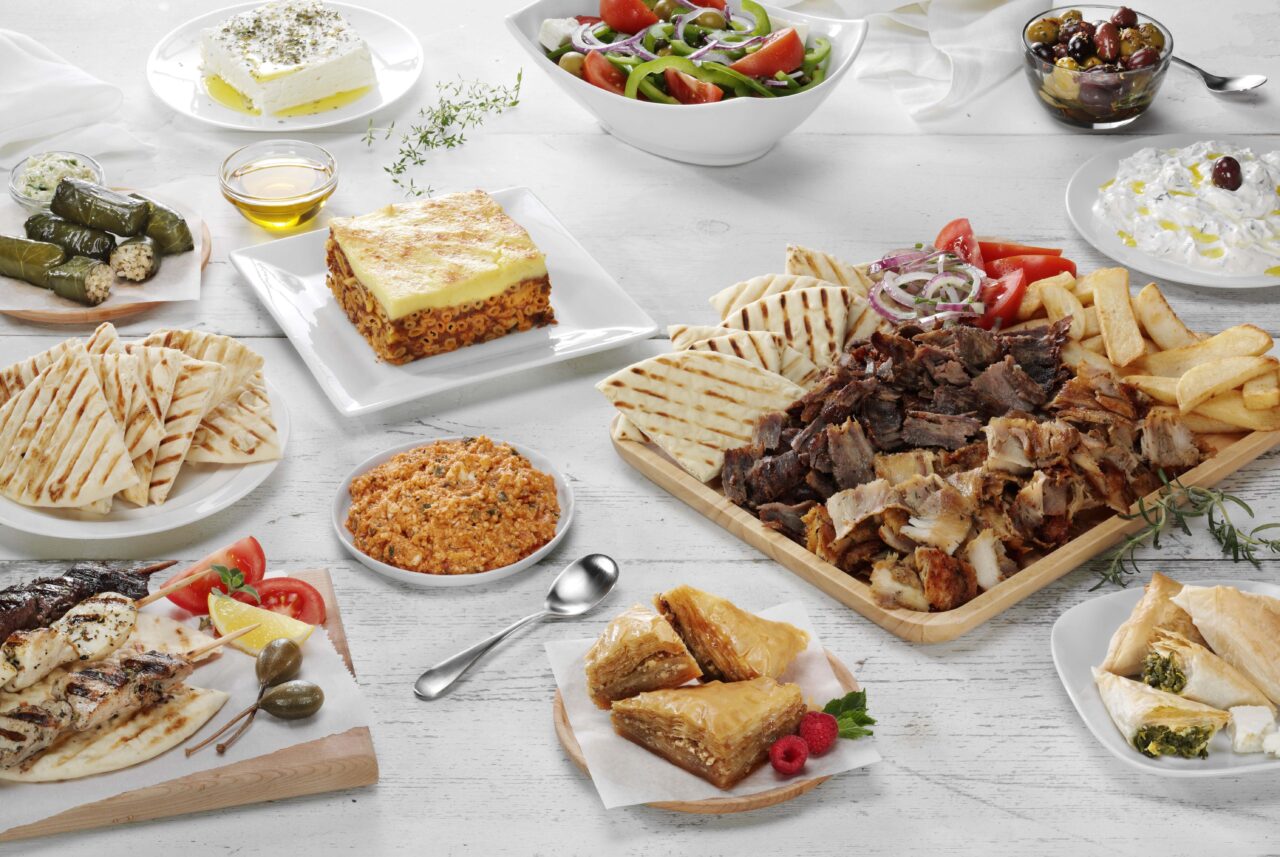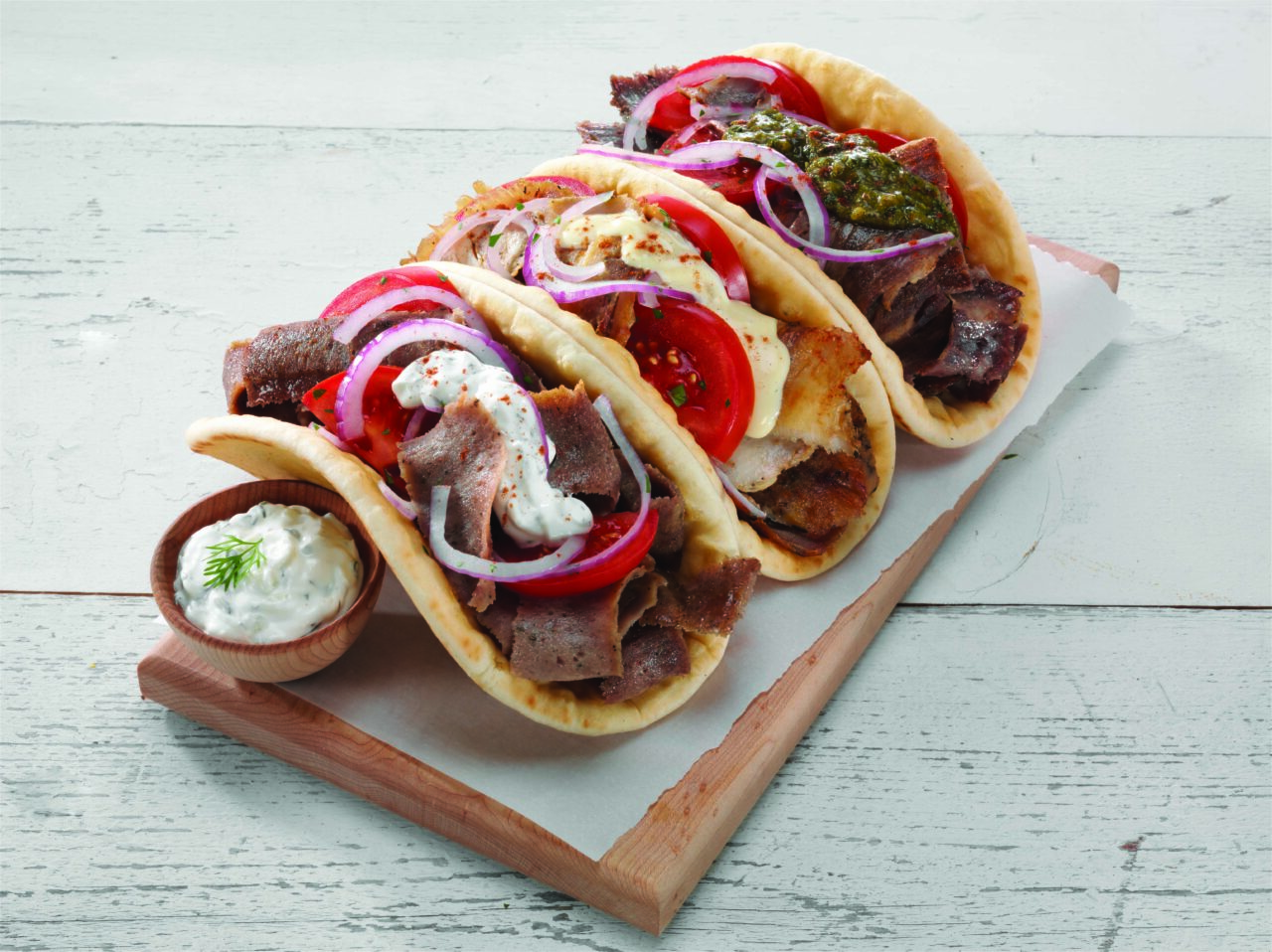Special to the Hellenic News of America
The Mediterranean food revolution in America had humble beginnings, when an automation engineer from the Greek village of Vonitsa figured out how to efficiently bring the gyro, a popular Greektown restaurant choice in Chicago, to the rest of America.
Soon, Peter Parthenis Sr. and his family were introducing the gyro and other Greek foods to the American palette.
In 1975, a second Greek immigrant and Chicago entrepreneur, Chris Tomarras, founded Kronos Foods Corp. His company produced the first pre-formed, ready-to-use gyro cones.
Both companies have continued to grow, capitalizing on the public’s interest and appreciation of Mediterranean foods in the past 20 years.
Both companies introduced a range of Mediterranean and global cuisine to food service providers.
Beyond gyros, there are specialty meats, pitas, flatbreads, tzatziki, hummus, falafel, Filo pies and dough, plant-based proteins, sandwich kits, and ready-to-eat food, as well as value-added bakery products.

Changing America’s Menus.
Kronos, now part of the portfolio of the private equity firm Entrepreneurial Equity Partners (e2p), was put up for sale in the spring of 2019.
Grecian Delight has wanted to join the two companies for 30 years and has aggressively tried to buy Kronos over the past 20.
This time, Grecian Delight was able to partner with e2p to secure financing and merge the two companies.
“In an [pandemic] environment with so much uncertainty, you can imagine there was a lot of challenge around putting the financing together, but we did get it completed,” says Parthenis.
On April 3, Grecian Delight and Kronos Food Corp. became one company under a new merger agreement.
“Our goal has always been for 30 years to try and put these businesses together just because it makes sense,” Parthenis said. “Now, two great organizations are coming together with a unified goal of putting our customers in a better position to succeed by delivering even more value-added products and services.”
The customers
Customers served by the two companies include retail, grocery store, and club stores like Costco, Sam’s Club, Trader Joe’s, and Walmart.
Their products reach the market place through national distributors like SYSCO and US Foods as well as independent and ethnic distributors.
Products go to fast food and quick-serve restaurants, independent family diners, colleges and universities, airports, as well as regional and national chains.
“Everything from an Arby’s to a Potbelly to Dunkin Donuts and all the Mediterranean chains,” Parthenis says.

New products from the merger and beyond
The merger means more product choices for customers, faster and better service, and an opportunity for continued growth in the Greek and Mediterranean food market.
That means accelerating two food sector trends, global cuisine and plant-based protein foods, like the Beyond Meat and Impossible Foods brands.
“The newest product for us is plant-based. We’re strategically in the protein plant-based product line so when you think of a [plant-based] burger or a grind to make meatballs and sausage, we’re making those products.”
Another outcome of the merger is access to proteins like gyros and Shawarma that’s ready to eat versus selling it frozen and having it cooked at the restaurant.
Ready-to-eat products save restaurants on labor, time, special equipment, and space.
“They just open up the bag, they heat it and serve it. You have a product that’s pre-cooked, pre-sliced and flame-broiled and it’s ready to serve versus having to receive it frozen in a cone format and cook it and prepare which is awfully time-consuming,” Parthenis says.

Brand loyalty
The merger means customers loyal to Grecian Delight or Kronos products exclusively will now be able to sample from both firms.
“Different products that maybe customers would not be open to before because they are brand loyal, now customers have an opportunity to look at a wider variety of products on their menu,” Parthenis says.
Now a Kronos customer will look at that extra falafel skew or that Tahini dip that was a Grecian Delight product and not have any qualms about buying it since Kronos and Grecian Delight are working together as one company.
“That was really the big selling proposition because it adds a lot of value to us and a lot of value to the customers.”
The merger means a combined customer reach in North America at about 100,000.
It also means enhanced services, larger research and development teams, more food scientists, a bigger sales team, and an increased capacity to quickly bring new innovations to market.
Customer first
The collaboration builds upon a “customer-first” approach.
“Grecian Delight and Kronos have gained a well-deserved reputation for being deeply passionate about serving the food industry and providing authentic eating experiences to consumers,” Parthenis says.
With that in mind, executives made sure that on the day of the merger, more than 100 of both company’s top customers were notified personally about the merger.
“When you think about going through something transformational like this, you’ve got to use this opportunity to really deepen your relationship and your connection with your customers,” Parthenis says.
Customer reaction has been “very positive.”
Also pleased with the progress of Grecian Delight and the merger? Company founder Peter Parthenis Sr.
“It’s a dream come true for him and also the founder of Kronos,” Parthenis says. “It’s taking the company to new heights. The company’s grown beyond his expectations.”
One team
The work now is to integrate the individual business cultures at both companies, headquartered in Illinois, to create one company, one team, to perpetuate trust and make sure everyone is treated fairly.
“My job is to make sure that everyone understands that we are all one and we’re all great,” Parthenis says. “Together we’re stronger. That’s the message.”

The pandemic
Parthenis acknowledges loss in revenue from the pandemic in 2020 but luckily, most of their customers are not in fine dining, where the most pain was felt.
“Some of our customers are doing very well because there’s less competition,” he says.
In neighborhoods where fine dining had to shut down or reduce capacity from the pandemic, people sought out alternatives, like fast food and quick service from casual Greek-owned restaurants, using drive-thru, take out and curbside pickup.
“Yes, our revenue will be less than last year, but we’re forecasting 2021 to be about 10 percent up versus 2020,” he says.
Parthenis says he has always operated from the perspective that where there’s adversity, there’s opportunity. The pandemic has proven that out.
“You’ve got to pay attention and you’ve got to move quickly because there’s opportunity in adversity. You have to be proactive and unfortunately, most businesses get defensive and go into survival mode,” he says.

Philanthropy in the pandemic
The Parthenis family has always given generously to local charities as it promotes Hellenism, educating others on Greek culture and values.
“There are key things our family continues to support because they are part of our family values, to give back,” Parthenis says.
The family continues to support the National Hellenic Museum in Chicago as well as the Chicago Metropolis, which oversees 55 different churches in multiple states.
The family’s resources have also gone to two hospitals and for cancer research.
While they’ve always supported local food banks, the early months of the pandemic saw food shortages in local businesses. Grecian Delight stepped up and shipped out thousands of pounds of food.
“We worked with local services to allocate and deploy food to people in need,” Parthenis says.
Future goals
Parthenis plans to continue the natural evolution of Grecian Delight and Kronos Food, as it moves further to develop globally-inspired cuisine.
“We’re actively looking and pursuing other companies and brands to acquire to help us continue accelerating our growth within Greek, Mediterranean, and globally inspired cuisine,” he explains.
To find out more, visit greciandelight.com, kronosfoodcorp.com, or e2pcapital.com.







